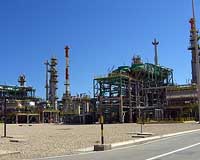 |
Luanda, Angola (UPI) Dec 23, 2009 OPEC oil producers sought to downplay Iraq's ambitious plans to more than quadruple its oil output when they met in Angola this week. But the thorny issue is expected to upset the cartel's equilibrium in the not-too-distant future and pose a significant challenge to Saudi Arabia, the world's largest producer and no great friend of the Shiite-dominated government in Baghdad. Iraq has been exempt from the quota system operated by the Organization of Petroleum Exporting Countries since August 1990, when Saddam Hussein invaded neighboring Kuwait and triggered the 1991 Gulf War. Iraq's last OPEC quota was 1.314 million barrels a day early in 1998, when the country was still under U.N. sanctions dating from the invasion of Kuwait. At that time, Iraq was selling crude under a U.N. program to buy food and medicine. But Baghdad is now demanding a far bigger production quota than it had 20 years ago. That has set the stage for what many in the energy industry expect will be a bruising battle with OPEC's dominant members. When Iraqi oil exports were cut off in 1990, other OPEC members, particularly Saudi Arabia, picked up the slack to maintain global supplies and stabilize prices. They are reluctant to have their quotas slashed to accommodate a resurgent Iraq. Iraq's oil minister, Hussain al-Shahristani, wants to boost production from its current level of 2.4 million barrels a day to 12 million barrels daily by 2016. If that target is reached, OPEC will have to take action to prevent Iraq, which has reserves estimated at 115 billion barrels of crude -- and possibly as much again not yet found -- from flooding the market and force it to fall in line with OPEC's 11 other member states. If Iraq is not restrained in its rush to restore its fortunes, the global energy market could be seriously destabilized. "This is really going to be a real issue within OPEC," says Judith Kipper, a director of the Energy Security Group at the New York-based Council on Foreign Relations. "If Iraq refuses to abide by the OPEC output level rules, then there's not much OPEC can do," she said. "Iraq may be landlocked, but it has a couple of major pipelines which could be restarted, and if relations with Syria and Lebanon ease then we could see Iraq pumping its oil to a Syrian or Lebanese port, bypassing OPEC countries." Shahristani made it clear at the Luanda meeting that Baghdad is in no mood to compromise because it needs to bolster production as soon as possible because it needs the oil revenue to bankroll national reconstruction. He warned that Iraq had been "deprived of its fair share" of oil production for too long. Although Iraq's oil output is not expected to rise significantly for a year or two, Shahristani spelled out that Baghdad was prepared to fight hard for a larger quota. "Countries' needs for reconstruction should be one of the top criteria, in addition to countries' capacity for production, countries' reserves," he declared. The issue has come into sharp focus in recent months when Baghdad awarded foreign oil companies 20-year contracts to upgrade the country's major oil fields, long neglected because of war, international sanctions and poor management. OPEC oil ministers, meeting in member state Angola for the first time Tuesday, decided to keep the current quotas for the time being. The issue is not likely to become a serious problem until Iraq's production reaches 3.5 million barrels a day, about 1 million more than it currently produces. But the problem will have to be addressed sooner rather than later and it will, at the very least, complicate the cartel's policymaking and possibly divide it. It was not clear whether the issue would come up at the next OPEC meeting scheduled for March 17 in Vienna. The organization's secretary-general, Abdullah el-Badri of Libya, acknowledged that the problem would have to be addressed but stressed it was "an issue for the future." "With prices at $75 (per barrel) everyone's happy and no one needs to touch the hot iron, but down the line, obviously, everyone sees this issue coming up," Johannes Benigni, CEO of JBC Energy, told Bloomberg Television. Share This Article With Planet Earth
Related Links Powering The World in the 21st Century at Energy-Daily.com
 Method Makes Refineries More Efficient
Method Makes Refineries More EfficientWest Lafayette IN (SPX) Dec 23, 2009 Refineries could trim millions of dollars in energy costs annually by using a new method developed at Purdue University to rearrange the distillation sequence needed to separate crude petroleum into products. The researchers have demonstrated their method on petroleum plants that separate crude, showing that 70 of the new sequences they identified could enable oil refineries to improve the ... read more |
|
| The content herein, unless otherwise known to be public domain, are Copyright 1995-2009 - SpaceDaily. AFP and UPI Wire Stories are copyright Agence France-Presse and United Press International. ESA Portal Reports are copyright European Space Agency. All NASA sourced material is public domain. Additional copyrights may apply in whole or part to other bona fide parties. Advertising does not imply endorsement,agreement or approval of any opinions, statements or information provided by SpaceDaily on any Web page published or hosted by SpaceDaily. Privacy Statement |